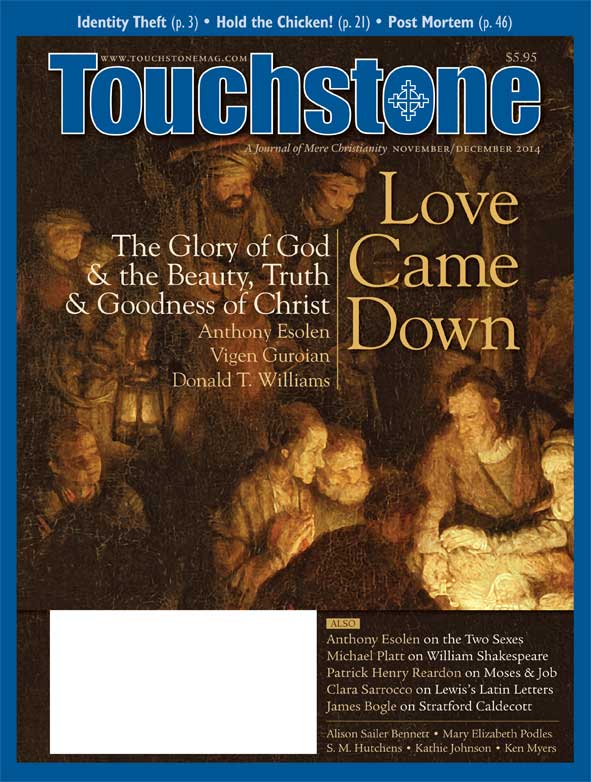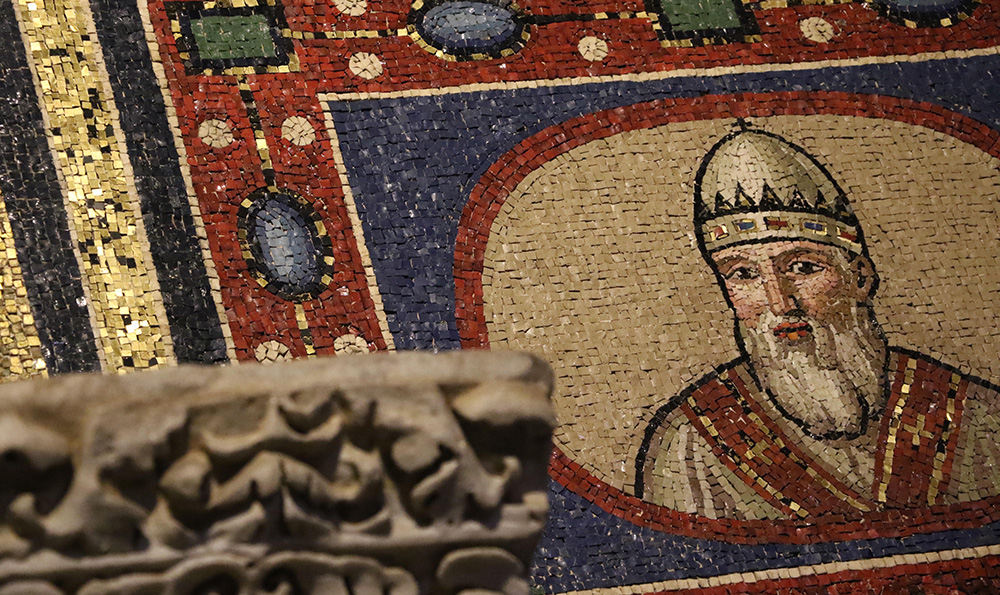View
Moses & Job
Patrick Henry Reardon on the Meekest of the Servants of God
The patriarchal setting of the Book of Job prompted some rabbis to speculate that Moses himself was its author (Talmud, Baba Bathra 14b). Although nobody today, as far as I know, holds that opinion, it is not without its attraction, especially if one considers certain affinities between the two men.
Most notable among these, perhaps, was the shared meekness of Moses and Job. Both could be called 'anav, a Hebrew word signifying poverty of spirit. This adjective is often translated as "poor," but it indicates a spiritual quality, better rendered as "meek."
Thus, Job appears to include himself when he speaks of the 'anevei 'ares,"the meek of the land" (Job 24:4). Meekness certainly describes the patience with which the man of Uz accepts his sufferings, particularly the psychological pain inflicted by his three so-called comforters. These self-righteous men, who are the very opposite of meek, bring this quality of Job into sharper prominence.

As for Moses, we are told he was 'anav me'od mikkol ha'adam, "meek beyond all mankind" (Num. 12:3). The meekness of Moses, I suppose, was most obvious when he endured the sundry complaints of those cantankerous Israelites, who daily burdened his life in the desert.
In this respect, we should observe that both Moses and Job are portrayed, not as giants on the earth, but as ordinary men, frail human beings. Each of them is introduced simply as a "man," an 'ish. As though foretelling Job's story as a whole, this noun is the first word used to describe him: 'ish hayah, "a man there was." Not a champion, not a hero, just a man.
The same noun, 'ish, is used of Moses in the very place where he is called "meek." The verse begins, weha'ish Mosheh 'anav, "the man Moses was meek" (Num. 12:3).
This description of "the man Moses" comes between two stories in which his desert compatriots put his patience severely to the test. So hard was the first trial that Moses complained to God, "Why have you afflicted your servant? Why have I not found favor in your sight that you should lay on me the burden of all these people?" (Num. 11:11). This problem is barely settled when Moses next finds himself challenged by his brother and sister, who demand to know, "Has the Lord indeed spoken only through Moses? Has he not spoken through us also?" This is the setting in which "the man Moses was meek beyond all mankind."
Different Kinds of Servants
The Lord's response to the complaint of Aaron and Miriam bears close inspection and should be compared with the response he gives to the comforters of Job. We will examine the two cases together. I want to do this according to the Greek text, where the parallels between the two accounts—as I hope to demonstrate—are intentionally crafted by the translator of Job.
Prior to our comparison of these two stories, it is necessary to comment briefly about the various Greek nouns used to translate the Hebrew word 'eved, "servant." The translators of our Greek Old Testament were familiar with different kinds of servants, and they recognized those differences in the ways they rendered the single underlying Hebrew noun.
For example, the word 'eved—"servant"—when it refers to Moses (Ex. 4:10 and many other places) or Job (Job 1:8; 2:3 and so forth), is almost never translated as doulos, a noun suggesting a state of bondage. The Greek translators generally did not consider this an appropriate word with which to speak of Moses and Job. (The sole exception is Malachi 4:4/LXX 3:24.)
Another Greek word for "servant" is pais, a noun more suggestive of a house servant. Although the Book of Exodus does not apply this term to Moses, the Book of Job uses it to speak of Job at the book's beginning (Job 1:8).
A third way of translating the Hebrew 'eved is therapon, a noun suggesting greater intimacy with the master, such as an attendant, a companion in arms. In classical literature, for instance, Patroclus was the therapon of Achilles. Because the service of a therapon was free, no Greek would have confused him with a doulos.
In the Greek Old Testament the preferred term for Moses is therapon (e.g., Ex. 4:10; Num. 12:7; Wisd. 10:16). So much was this the case that, in our earliest Christian literature, this term was reserved exclusively for Moses (Heb. 3:5; Clement of Rome, 4:12; 43:1; 51:3; Pseudo-Barnabas 14:4).
Although, as we have seen, the Book of Job begins by calling Job God's pais, by the end of the book he has become God's therapon. (I follow the codices Vaticanus and Sinaiticus, which are more consistent on this point.) Why this change? The reason, I believe, is the translator's recognition of a likeness to Moses in the final scene of Job's vindication before his three accusers. This scene reminded the translator of the episode in which the Lord vindicated Moses against Aaron and Miriam.
God's Therapon
We are ready now to compare these stories. I propose to do so with four observations.
First, in both the stories, God begins by appearing on the scene and revealing himself. In the Moses account we are told, "the Lord came down in the pillar of cloud and stood in the door of the tabernacle and called Aaron and Miriam." In the corresponding narrative of Job, we read, "Then the Lord answered Job out of the whirlwind."
Second, in each case, the Lord, having revealed himself, vindicates his faithful servant against his accusers. Thus, we are told, the Lord speaks face-to-face with "my servant Moses," inasmuch as "he is faithful in all my house." We note here the significant expression "my servant Moses"—ho therapon Mou Moyses. The same words are repeated when the Lord interrogates Aaron and Miriam, "Why then were you not afraid to speak against my servant Moses?"
Using this identical expression, the Lord is equally displeased with Job's challenger, Eliphaz the Temanite: ""My wrath is aroused against you and your two friends, for you have not spoken right of me, as my servant Job [ho therapon Mou Iob]." Job, who began as God's pais, is now identified as God's therapon. The quality of Job's service to God has undergone a transformation since the beginning of the book. He has now become, like Moses, the intimate of God.
Third, both Moses and Job intercede with the Lord on behalf of their critics. Thus, Moses pleads for the healing of Miriam. In the case of Job, the Lord instructs Eliphaz, "Go to my servant Job, and offer up for yourselves a burnt offering; and my servant Job shall pray for you. For I will accept him, lest I deal with you according to your folly; because you have not spoken right of me, as my servant Job." Here the word therapon is found three more times, as though to make sure that the reader does not miss Job's correspondence to Moses.
Fourth, in both stories the designation of God's therapon comes from the Lord himself: "my servant." Only God can identify his close associate, his companion in arms. The highest testimony the Lord gives of his faithful servant Job—after his severe trials—is to liken him to Moses.
Patrick Henry Reardon is pastor emeritus of All Saints Antiochian Orthodox Church in Chicago, Illinois, and the author of numerous books, including, most recently, Out of Step with God: Orthodox Christian Reflections on the Book of Numbers (Ancient Faith Publishing, 2019).
subscription options
Order
Print/Online Subscription

Get six issues (one year) of Touchstone PLUS full online access including pdf downloads for only $39.95. That's only $3.34 per month!
Order
Online Only
Subscription

Get a one-year full-access subscription to the Touchstone online archives for only $19.95. That's only $1.66 per month!
bulk subscriptions
Order Touchstone subscriptions in bulk and save $10 per sub! Each subscription includes 6 issues of Touchstone plus full online access to touchstonemag.com—including archives, videos, and pdf downloads of recent issues for only $29.95 each! Great for churches or study groups.
Transactions will be processed on a secure server.
more from the online archives
calling all readers
Please Donate
"There are magazines worth reading but few worth saving . . . Touchstone is just such a magazine."
—Alice von Hildebrand
"Here we do not concede one square millimeter of territory to falsehood, folly, contemporary sentimentality, or fashion. We speak the truth, and let God be our judge. . . . Touchstone is the one committedly Christian conservative journal."
—Anthony Esolen, Touchstone senior editor










